|
 Secure Site
Secure Site
|
 |
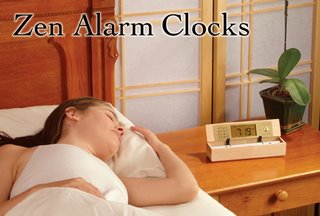 Feng Shui your Bedroom for Better Sleep Feng shui is more than an elaborate decorating scheme. The ancient Chinese art of balancing your environment’s energy flow, known as qi (“chee”), can nurture your health and foster longevity.
“The atmosphere of your home will affect you on a physical level,” explains feng shui consultant Lillian Bridges. “For example, insomnia might be related to having too much light in your bedroom, while inflammatory problems might be aggravated by environments that are too chaotic. To a large degree, feng shui is basically common sense combined with good aesthetics.”
To bring positive, health-enhancing energy into your home, ask yourself: What isn’t working in my life? What kind of health conditions am I dealing with? “If you’re depressed, your house may be too dark; bringing in fire energy with more light and warm colors like pinks and peaches can lift your spirits,” Bridges says.
She also suggests covering your windows at night, and guarding your house with such protective symbols as a crimson phoenix, green dragon, or white tiger. “If you don’t feel safe, this can damage the nervous system and lead to stress-related problems like stomachaches and headaches.”
A home filled with clutter can create a “stale energy” that weakens the immune system, according to Total Feng Shui author Lillian Too. Toss out old papers, unwanted clothes, and other inessential belongings at least once a year. Take good care of your plumbing, which Too calls “the arteries of the home.” And as you’re freeing up energy blockages, beautify your house by adding qi-enhancing color to cluttered and dark spaces. Too recommends painting these areas white to invite in active energy, and brightening with soft, warm light. Also, decorate by adding ‘Beauty Elements’ to your home. One might add flowers or a potted Orchid to spaces that need brightening. The Zen Alarm Clock with Chime (Now & Zen, $124.95) will add uplifting ‘Sound Elements’ to beautify your living space.
adapted from Natural Health Magazine, by Elizabeth Barke
 Now & Zen's Chime Alarm Clock Shop in Downtown Boulder Now & Zen’s Clock Store
1638 Pearl St.
Boulder, CO 80302
(800) 779-6383
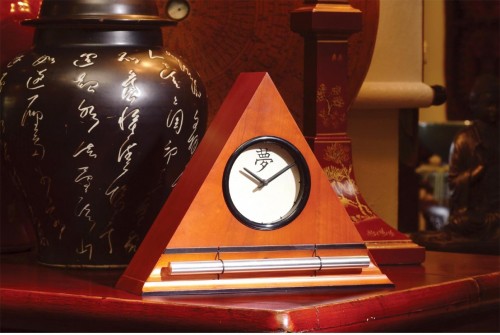 Use Zen Alarm Clocks with Soothing Chime to Feng Shui your Bedroom
Posted in Feng Shui, sleep, Well-being
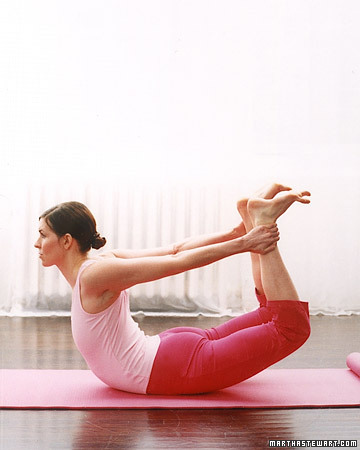 Bow Pose A morning yoga practice composed of the following poses can counter the fiery energy of the hot summer season. On its own or as part of our Ayurvedic weekend retreat, this series is designed to energize without overheating and can be done at home in as little as 30 minutes.
Lie face down, hands by your sides, palms facing up, legs together. Bending at the knees, bring your heels as close to your buttocks as possible. Raise your head, keeping your chin on the floor, then reach back with your hands and grasp your ankles firmly. Pull with your legs and arms, raising your head, chest, knees, and thighs off the floor. Raise your clasped legs as high as possible, keeping the spine relaxed. Rest your entire body weight on your navel. Breathe in and slowly exhale. Hold for 5 to 10 breaths, then release. Repeat the pose two times.
adapted from Wholeliving.com
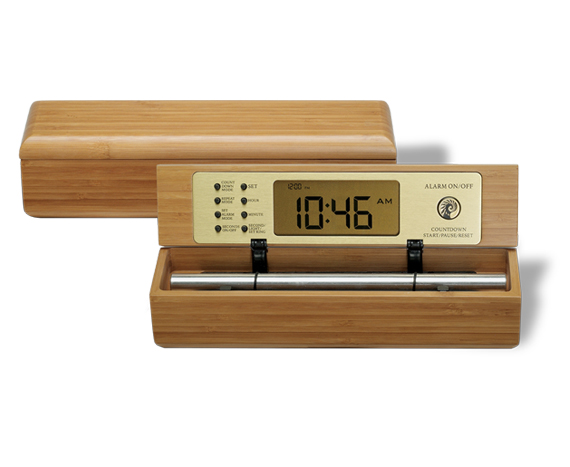 Yoga Timer with Gentle Chime Now & Zen – The Yoga Timer Shop
1638 Pearl Street
Boulder, CO 80302
(800) 779-6383
Posted in Bamboo Chime Clocks
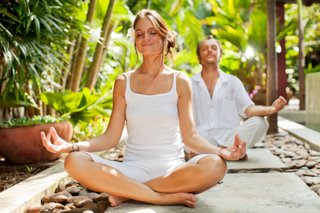 Once you experience the Zen Timepiece's progressive tones, you'll never want to meditate any other way. Cheap, low-tech stress relief may also protect against depression, insomnia, and anxiety
Meditation is no longer just for the groovy folk. A just published study in the American Journal of Hypertension suggests the practice may bring cardiovascular and mental-health benefits. The research, conducted at American University in Washington, followed 298 students, half of whom practiced transcendentalmeditation for 20 minutes once or twice daily over three months and half of whom did not. Results: A subgroup of subjects in the meditation group who were at increased risk for hypertension significantly lowered their blood pressure and psychological distress and also bolstered their coping ability. The average reduction in blood pressure in this group—a 6.3-mm Hg decrease in the top (systolic) number of a blood pressure reading and a 4-mm Hg decrease in the lower (diastolic) number, compared with the control group—was associated with a 52 percent reduction in the risk of developing hypertension in the future. Meditators who were not at increased risk for hypertension saw a reduction in psychological distress, depression, and anxiety as well as increased coping ability but no significant lowering of blood pressure. The results are particularly meaningful at a time when “improvement in mental health is of great concern as greater numbers of college students are being treated for anxiety and depression than ever before,” says lead study author, Sanford Nidich, professor of physiology and health at the Institute for Natural Medicine and Prevention at Maharishi University of Management in Iowa.
Lately, meditation has been garnering attention from a host of medical and scientific researchers. More than 120 meditation studies are listed on clinicaltrials.gov, a clearinghouse for research supported by the National Institutes of Health, investigating the intervention in patients with conditions from cancer and heart disease to post-traumatic stress disorder, insomnia, and binge eating. It’s no cure-all, but early research is suggesting meditation could play a helpful role in mediating the stress response that contributes to a number of physical and mental conditions.
In a country famous for medical innovation and high-tech treatments—not to mention their high cost—Americans, too, have begun to embrace complementary and alternative interventions like meditation, acupuncture, and “natural” supplements. According to a recent study sponsored by the NIH’s National Center for Complementary and Alternative Medicine, more than 1 in 3 adults sought such healthcare in 2007—and collectively spent $40 billion out of pocket. But with the exception of the classes, books, or CDs one might buy to learn the ins and outs of “om,” focusing on one’s breath, or becoming more mindful, the practice of meditation is free.
One simple thing seems clear: Find a type of meditation that you like. “What’s really important,” says Richard Davidson, neuroscience and meditation researcher at the University of Wisconsin-Madison,” is that a person find a particular style [of meditation] they’re comfortable with so they continue to practice.” Some styles train practitioners to focus on an object or a mantra; others cultivate positive emotions; others still aim to train practitioners not to judge thoughts that arise but to just accept them and not get attached. More meditation, it seems, offers stronger effects; Davidson’s research on monks who had practiced for tens of thousands of hours in their lifetimes managed to change their brains’ functioning and structure. Benefits appear to be attainable with less of a time commitment, he adds—perhaps somewhere between 20 and 40 minutes daily.
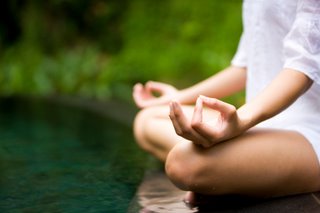 Meditation Pose Not all doctors have bought into the merits of meditation as a treatment, nor should they just yet. The hard research medical practitioners swear by is still in the early stages. The National Center for Complementary and Alternative Medicine is starting to fund needed research with larger sample sizes of participants and solid study design, says Jeffrey Greeson, meditation researcher and assistant clinical professor in the department of psychiatry and behavioral sciences at Duke University School of Medicine. He predicts that results will begin to emerge in the next five years. Meantime, based on some encouraging preliminary findings, here are five reasons a clinician hip to the importance of the mind-body connection may cite for prescribing meditation—and one reason she may choose not to.
By SARAH BALDAUF for US News
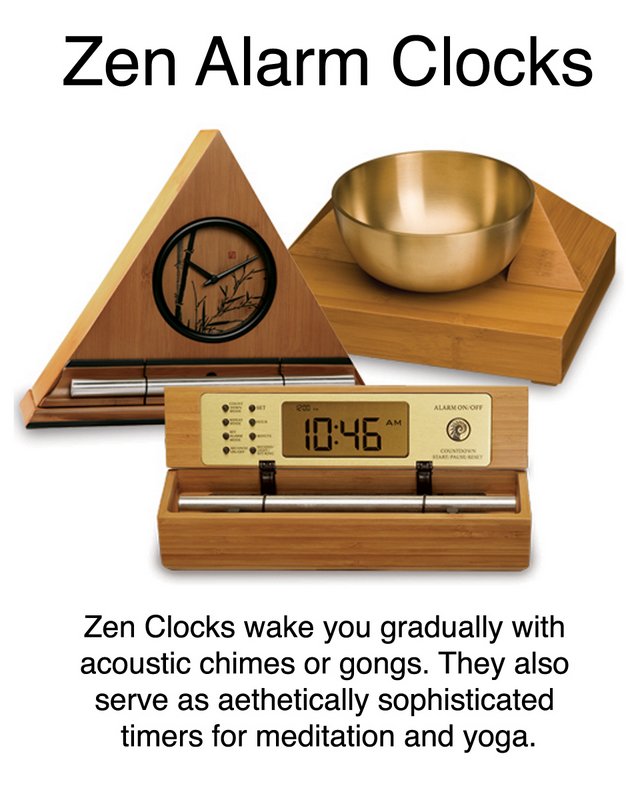
Now & Zen – The Meditation Timer Store
1638 Pearl Street
Boulder, CO 80302
(800) 779-6383
Posted in Meditation Tools
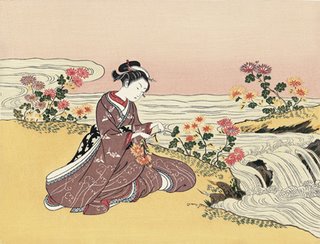 Harunobu Suzuki, A girl Collecting Cchrysanthemum Dem by the Stream Culprit: The Blues
Research has indicated that people with depression may be four times more likely than the nondepressed to experience unexplained fatigue. Aerobic exercise—specifically, 30 minutes or more three to five days a week—is effective at treating mild to moderate depression, and may minimize the sleepiness associated with it. Set your Zen Timer for 30 minutes and try a few yoga poses in the comfort of your own home. If that doesn’t help, however, speak to your doctor, who may recommend talk therapy or a mood-boosting medication, like a selective serotonin re-uptake inhibitor (SSRI). If your depression and related fatigue seem to strike more frequently in winter, you could have seasonal affective disorder (SAD). Treatment for SAD may include using a special light box, says Marla Wald, a psychiatrist at Duke University Medical Center, in Durham, North Carolina. But venturing outside for about 20 minutes a day can provide similar benefits, she says.
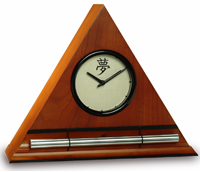 banish the blues by setting your zen timer Now & Zen Headquarter Store
1638 Pearl Street
Boulder, CO 80302
(800) 779-6383
Posted in Chime Alarm Clocks, mindfulness practice, Zen Alarm Clock, Zen Timepiece by Now & Zen
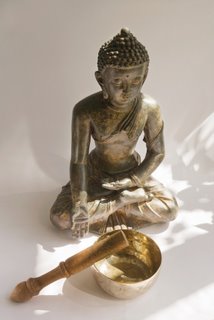 Carved Wooden Thai Buddha with Singing Bowl The Habit: Running Late
Why you do it: The nice reason? You’re a pleaser and an overdoer, packing too much in. Not so nice? Deep down, you may think your time is more important than the time of those waiting. Either way, you lack some essential time-management skills.
How to stop: When someone asks you to do something, don’t accept right away. Say you’ll get back to him, then decide whether you have the time. Also, figure out which tasks always seem to make you late. Maybe it’s drying your hair in the morning: Time yourself to see how long it takes, then allot enough time in your routine. Tricks: Set your Zen Timepiece with Gong Alarm five minutes fast and build in time for unexpected delays. And always call ahead if you’re running late. Not only is it gracious but the shame of making repeated calls might also be the incentive you need to be punctual.
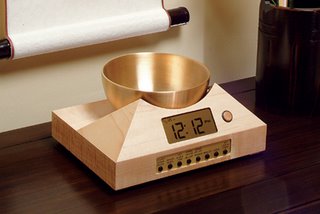 Now & Zen 1638 Pearl Street Boulder, CO 80302
Posted in Chime Alarm Clocks, Now & Zen Alarm Clocks, sleep, Sleep Habits
 Butterflies Plate #21, Natural History of Britain on the patio
the afternoon drifts along
with the butterfly.
– Patricia J. Machmiller
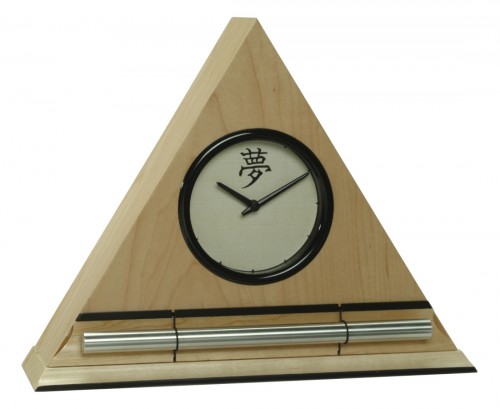 Maple Dream Kanji Zen Alarm Clock, progressive chime alarm clock
Now & Zen – The Zen Alarm Clock Store
1638 Pearl Street
Boulder, CO 80302
Posted in Beauty, Japanese Inspired Zen Clocks, Japanese Poetry, Meditation Timers, Meditation Tools, mindfulness practice, Now & Zen Alarm Clocks, Progressive Awakening
 set your alarm so you can enjoy a nap Author Cathleen Schine pays tribute to the many pleasures of daytime sleeping. Read her testimonial, then go catch 40 winks yourself.
by Cathleen Schine
Scientific research has finally caught up with the lifework of my family. For three generations, we have been exploring, questioning, experimenting, passing along our findings from parent to child. We are not neuroscientists or psychologists, like those who have come after us. We are simply…nappers. A nap, where I come from, is sacred.
Sometimes, after large and indulgent family meals, we nap communally, sharing sofas head to foot, curled in chairs and sprawled, beside the dog and one another, on the floor. We firmly believe that no gathering can be deemed a success unless it culminates in every single person falling asleep in the living room.
Mostly, however, we understand the nap to be an endeavor embarked on alone, though often recounted later in every detail, like a Homeric epic tale, to eager listeners. My mother calls to tell me how pretty the light looked through the curtains when she came home from work. Of course, she had to sink into the couch and take a nap. My brother describes a snooze in his red chair with a book and Chester the cat. In the way that some people never suffer from a cold but always have a “terrible” cold, in the way that rain in California is never rain but “torrential” rain, naps for my family are never naps but “delicious” naps.
Oddly, the new scientific nap studies do not mention “delicious” naps. Their focus is on the practical use of these short bouts of sleep and the benefits they bestow on us, as if they were fiber-rich food. Scientists have found that naps make us more alert and more creative, improve our mood, and increase our productivity. Matthew Walker, an assistant professor of psychology at the University of California at Berkeley, was quoted by theNew York Times as saying, “You need to sleep before learning, to prepare your brain, like a dry sponge, to absorb new information.”
Although my brain often feels like a dry sponge, the one you find under the kitchen sink, way back next to the jar of desiccated silver polish, I cannot endorse this utilitarian interpretation of the nap.
I am gratified to know that a Harvard Medical School study showed that a 45-minute nap improves learning and memory, and I am relieved to discover that a 26-minute nap in flight enhanced a pilot’s performance by 34 percent and overall alertness by 54 percent (his copilots manned the controls, so don’t worry). The biphasic sleep schedule (which involves taking a nap in addition to sleeping at night) may help us move information from the hippocampus to the prefrontal cortex, where it becomes part of our long-term memory.
This is all to the credit of the nap, which I am prepared to celebrate in every way possible. But where, in these studies, is the joy? The romance? The cool, smooth surface of the white pillowcase? The light seeping gently through the white curtains? The slow inhalation of that clean, laundered scent? Where, indeed, in these studies, is the light itself?
A nap is not a nap without light. This is what distinguishes it from a good night’s sleep. A nap is a stolen moment, not the natural culmination of the day. A nap is secret, illicit. It is sleeping during the day, and the day must be present and visible. There must be light—ideally dappled in a garden or slanted through a window: soft and filtered and gentle. An afternoon sleep in a darkened room is not a nap, in my opinion. It is a migraine.
In fact, the best night’s sleep I ever had was on a trip to Norway, just near the Arctic Circle, in the summer. The sun never set, and I was able to “nap” all night.
 Enjoy a good nap Researchers suggest that naps are exceedingly effective in clearing our minds so we can fill them up again, and though I object to evaluating a nap solely in terms of its “effectiveness,” I would say that afternoons have the best napping light—when the sun seems to settle into a soft, deep repose. I don’t think a nice midmorning snooze should be devalued, however.
After a night of insomnia, after watching the milky pale light of dawn appear around the edges of the window shades, after hearing the chatter of sparrows, to get out of bed at last and have a cup of coffee and read the paper and feel blissfully alone, and then, like a punch to the head, be overcome with fatigue and stumble back to bed, where the sheets and the pillowcase have become especially cool and inviting—this is, without a doubt, one of life’s unforgettable pleasures.
Which brings me to another distinction researchers have not yet made: the city nap versus the country/suburban nap. When I’m in my apartment in New York City and about to take an afternoon nap, I usually turn on the air conditioner. This muffles the world outside in a way that, as far as I’m concerned, is not necessary in a morning nap that follows a sleepless night but is extremely pleasant in the afternoon. The young men generously sharing their booming music through open car windows, the gym class bouncing basketballs on their way to the park—all of this is part of the city I love, but not part of a nap.
Outside the city, however, the window stays open. The sound of a distant dog barking, of a crow calling harshly from a high branch or a finch singing from a telephone pole, the wind rustling the leaves—this is the stuff of naps.
When my eldest son was very small, he had trouble falling asleep at night. It turned out he was worried that he might not wake up. He has always been a thoughtful person, and in this association of sleep and death, he had joined a long tradition: the Bible, Shakespeare, the Romantic poets. There is something about the oblivion of sleep that reminds us of death—or at least what we think (or worry or, at times, even hope) death might be like. Naps are different: They are not weighted with the profound. Naps float, weightless and temporal, nature’s whims.
I was thrilled to read about the importance of naps in the formation of memory, and I’m grateful for the scientific work being done in this area. But thinking of that little boy pondering the inevitable and the unknowable, I was even more grateful for a family legacy that taught me, and allowed me to teach him, that not everything has to be useful, not everything has to lead to something more—that sometimes, for no reason and with no purpose, you can just curl up on the couch, feel the soft breeze, and drift into a soft, delicious sleep that leads to nowhere in particular, and back again. Remember to set you gentle chime alarm so that you nap can end calmly.
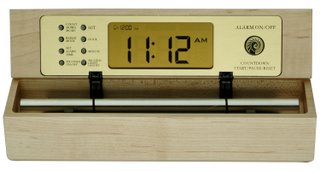 soothing chime alarms, a great tool for napping About the Author
Cathleen Schine is the author of eight novels, including The New Yorkers, The Love Letter, Rameau’s Niece, and, most recently, The Three Weissmanns of Westport. She lives in New York City and Venice, California.
 chime alarm clock store, Boulder, Colorado Now & Zen Chime Alarm Headquarter Store
1638 Pearl Street
Boulder, CO 80302
(800) 779-6383
Posted in Bamboo Chime Clocks, Now & Zen Alarm Clocks, Progressive Awakening, sleep, Sleep Habits
 it's okay to yawn Afraid to risk rudeness and let out a hearty yawn? Well, here’s an excuse to give Miss Manners a hissy fit: According to neuroscientist Andrew Newberg, MD, director of the Center for Spirituality and the Mind at the University of Pennsylvania, yawning is one of the best-kept health secrets. “If you want to maintain an optimum healthy brain, it is essential that you yawn,” says Newberg. The action stimulates neural movement in certain areas of the mind and regulates brain temperature and metabolism—all of which can increase muscle control, enhance sensuality, and even ward off jet lag. Newberg suggests yawning 10 times in a row every day, along with your regular workout or wellness routine. A nightly yawning ritual can help you:
Chill out. Newberg says a good yawn can relax you more effectively than meditation. “More than simply calming the body, yawning brings the mind into a heightened state of cognitive functioning.”
Stay focused. “Yawning rids the brain of sleepiness, helping you keep your attention on important ideas and concepts,” says Newberg. So why do we start yawning before we hit the sack? Because it also helps regulate our internal clock: When we’re tired, yawning signals sleep. No need to set your Zen Alarm Clock for bedtime quite yet.
Be more compassionate. Studies show yawning stimulates the part of the brain responsible for generating empathy and social awareness. So intentional yawning may actually strengthen our ability to be kind to others.
adapted from Natural Solutions Magazine, October 2009 by Danielle Winston
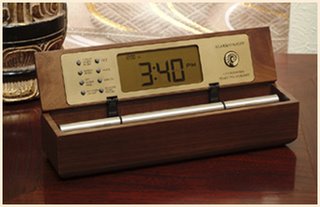 Digital Zen Alarm Clock Now & Zen
1638 Pearl Street
Boulder, CO 80302
(800) 779-6383
Posted in Beauty, intention, Natural Awakening, Now & Zen Alarm Clocks, Sleep Habits, Well-being
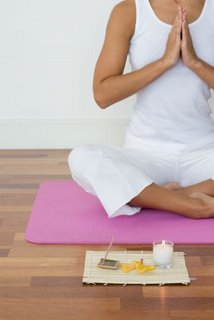 Take a Moment for Yourself When You Need a Moment…
Try a Sitting Meditation
To recenter your mind and body, sit on the floor in a comfortable position with a straight back. Set Your Zen Timepiece to repeat every 10 seconds. Inhale for ten seconds, then smoothly exhale for ten more. Repeat for at least three minutes and increase to 20 minutes as you improve.
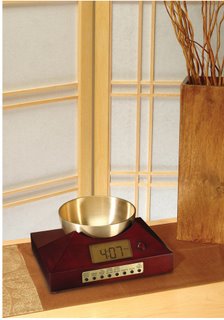 Set Your Singing Bowl Alarm to Repeat Every 10 Seconds
Posted in Bamboo Chime Clocks, Zen Timepiece by Now & Zen, Zen Timers
 time your walking meditation with the Digital Zen Timer by Now & Zen, Inc. Ways to Relive Stress:
Get rid of nervous tension by inhaling as you take four steps, then exhaling for four steps. Repeat for at least three minutes (the longer, the better). Work up to six to eight steps per inhale and exhale. Use your Digital Zen Timer on the ‘Repeat Mode’ so that it will chime every three minutes to time yourself.
Now & Zen Headquarter Store
1638 Pearl Street
Boulder, CO 80302
 Timers and Alarms with Chimes
Posted in Chime Alarm Clocks, Meditation Timers, Meditation Tools, mindfulness practice, nature, Now & Zen Alarm Clocks, Yoga Timer, Zen Alarm Clock
|
|
|
|